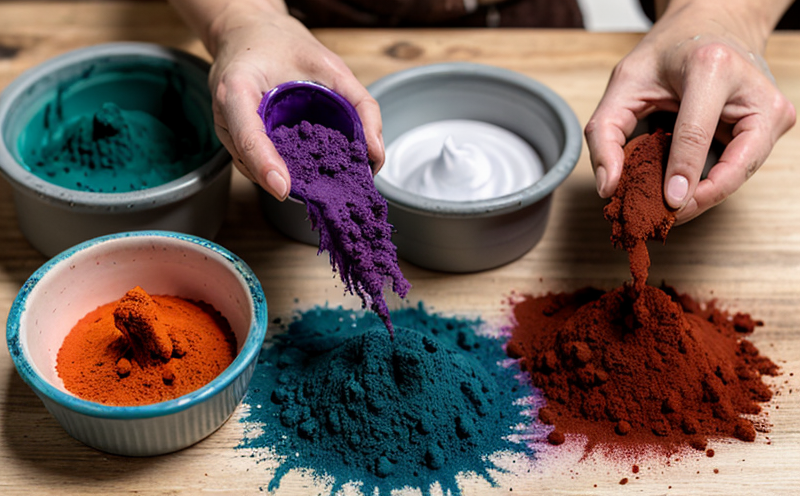Frozen Food Dye Residue Testing
The demand for frozen food products has seen significant growth in recent years. These foods are not only convenient but also provide a wide range of flavors and textures that cater to diverse consumer preferences. However, the use of dyes in these products can be controversial due to concerns about potential health impacts. Ensuring compliance with regulations regarding dye residues is therefore crucial for manufacturers.
In the frozen food sector, dyes are used primarily as colorants to enhance the visual appeal and shelf life of products. Commonly used dyes include FD&C (Food, Drug & Cosmetic) colors approved by regulatory bodies such as the FDA in the United States or EFSA in Europe. These dyes must be within specified limits to ensure consumer safety.
Frozen food dye residue testing is a critical process that involves analyzing the amount of dye present in frozen products after they have undergone freezing and thawing cycles. This test ensures that the dye levels are safe for consumption. The challenge lies in simulating real-world conditions while maintaining accuracy and precision.
The process typically begins with sample preparation, where a representative portion of the frozen product is taken and thawed under controlled conditions to mimic actual usage scenarios. Post-thawing, an extraction method such as methanol or ethanol may be used to dissolve any residual dyes into a solution. This solution can then undergo further analysis.
For accurate testing, instrumental methods like High-Performance Liquid Chromatography (HPLC) are employed. HPLC allows for the precise quantification of dye residues by separating and identifying individual components in the sample. The method involves injecting the extracted solution into the chromatographic column where different dyes separate based on their chemical properties.
Acceptance criteria vary depending on regional regulations, but generally, any detected residue should not exceed specified limits set forth by regulatory bodies such as EU Directive 2017/2131 or FDA regulations. Compliance with these standards ensures that the product is safe for consumption and meets legal requirements.
The importance of this testing cannot be overstated. Not only does it protect consumer health, but it also enhances brand reputation by demonstrating a commitment to quality and safety. For manufacturers, adhering to dye residue limits helps avoid costly recalls and lawsuits due to non-compliance with regulations.
- Customer Impact: Ensures product safety, builds trust in the market, and avoids legal issues.
- Safety Assurance: Protects consumers from potential health risks associated with excessive dye consumption.
- Regulatory Compliance: Meets international standards like EU Directive 2017/2131 and FDA regulations.
In conclusion, frozen food dye residue testing is an essential aspect of quality assurance in the frozen food industry. By adhering to rigorous testing protocols and maintaining strict adherence to regulatory standards, manufacturers can ensure they produce safe, high-quality products that meet both consumer expectations and legal requirements.
Eurolab Advantages
At Eurolab, we pride ourselves on delivering exceptional services in chemical testing. Our expertise spans a wide range of industries, but our commitment to excellence is particularly evident in the field of frozen food dye residue testing. Here’s why choosing us for your testing needs is advantageous:
- State-of-the-Art Facilities: Equipped with cutting-edge HPLC equipment and experienced personnel.
- Comprehensive Testing Capabilities: Covering all aspects of dye residue analysis, from sample preparation to final reporting.
- Regulatory Compliance: Our tests adhere strictly to international standards such as EU Directive 2017/2131 and FDA regulations.
- Expertise in Frozen Foods: With a deep understanding of the challenges faced by manufacturers in this sector, we provide tailored solutions.
- Customer Satisfaction: Our high-quality service is backed by positive feedback from satisfied clients.
- Rapid Turnaround Times: Efficient processing and reporting to minimize disruptions for your operations.
Trust Eurolab for all your frozen food dye residue testing needs. We are committed to providing accurate, reliable results that meet the highest standards of quality and compliance.
Quality and Reliability Assurance
The quality and reliability of our services at Eurolab are paramount. Our commitment to excellence ensures that every test we perform meets the stringent requirements set by regulatory bodies and industry standards. Here’s how we ensure accuracy and precision in all our tests:
Advanced Instrumentation: Equipped with top-tier HPLC instruments, we can provide precise results that are trusted by leading manufacturers.
Skilled Personnel: Our team comprises experts with extensive experience in chemical testing who adhere to strict protocols and procedures.
Comprehensive Reporting: Detailed reports are provided, offering insights into the dye residue levels found in your samples. These reports also include recommendations for any necessary adjustments or improvements.
Continuous Improvement: We stay updated with the latest developments in testing methodologies and regulatory changes to ensure our services remain cutting-edge.
We take pride in maintaining a high level of service that meets the needs of our clients. Our reputation is built on the trust we have earned by consistently delivering accurate, reliable results. Choose Eurolab for your frozen food dye residue testing needs, knowing you are partnering with a company dedicated to excellence and reliability.





